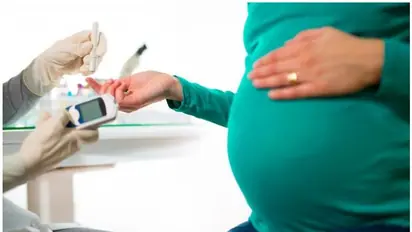Preemptive approach required to tackle gestational diabetes in India: Union Minister Jithendra Singh

Synopsis
Preemptive approach required to tackle gestational diabetes in India; emphasise on breaking the cycle, said Union Minister Dr Jithendra Singh.
Bengaluru: Expressing strong concern over the rising incidences of GDM (Gestational Diabetes Mellitus) among pregnant women in India, Dr Jithendra Singh, Union Minister of State for Prime Minister’s Office, exhorted the healthcare community to take a preemptive approach in tackling the deadly non-communicable disease, which is gaining an epidemic proportion.
“We are a new India, a young India. We cannot afford to lose the energy and strength of our youths to these diseases. We must tackle them effectively, as 70% of our population is below the age of 40 years. All of us are worried about the increasing prevalence of GDM as well as Type 2 Diabetes Mellitus among youngsters. Futuristic measures must be taken on prevention. We must break this cycle by tackling the issue at the womb level,” Dr Singh said in his inaugural address of the Diabetes in Pregnancy Summit.
Organised jointly by ARTIST for Her and IHW Council, the summit is part of ‘Shapath’ initiative rolled out recently to make universal healthcare inclusive for women to usher in a healthy new generation for a healthy India. DIPSI guidelines on managing diabetes effectively were released on the occasion. Applauding ARTIST for Her and IHW Council, the minister emphasised the need for institutionalising spot tests for pregnant women.
“There are two preventive ways to tackle the issue. One, institutionalise tests for pregnant women irrespective of the stage at which they visit the hospital. Second, in case GDM has already set in, we must ensure tight control so that the diabetes risk is not passed on to the baby,” he pointed out.
In her opening remarks, Dr Hema Divakar, CEO of ARTIST for Her and past president of FOGSI, brought to the fore the challenges faced by the country, as the non-communicable diseases (NCDs) were emerging as a major health concern of the nation that could impact the productivity of the future generation.
“We should not allow India to become the diabetes capital of the world. Every stakeholder of the healthcare sector must make it a professional as well as personal agenda to tackle the NCDs at the fundamental level,” she said.
“For how long can we continue to harp on the challenges? We must look at ways to tackle NCDs, especially GDM, anaemia, and malnutrition among women now. A healthy mother can contribute to a healthy future generation. Hence, we have resolved to make sure that every woman has access to quality healthcare through our new initiatives,” Dr Hema added.
Prof (Dr) Seshiah, founder patron, Diabetes in Pregnancy Study Group of India (DIPSI), in his address, chalked the history of diabetes impacting the Indian healthcare sector since the 70s. Dr Seshiah, who is acknowledged for his pioneering work relating to diabetes in India, noted that many factors were responsible for diabetes to reach this level in India. “In the 70s, hardly any testing or protocols existed to detect GDM among Indian women. Its prevalence gained prominence after the healthcare community became aware of the issue and we are making concerted efforts.”
Sharing similar thoughts, Dr Anil Kapur, chairman of the board, World Diabetes Foundation, said, “Our efforts must start at the womb level. A mother’s health is more critical because that’s where a new life begins. When undernourished women become pregnant and if GDM is not detected, their babies will be at high risk of carrying forward diabetes. We must ensure that women are in optimal health before pregnancy.”
Dr Alpesh Gandhi, president, Federation of Obstetric & Gynaecological Societies of India (FOGSI) and Dr S Sacchidanand, vice-chancellor, Rajiv Gandhi University of Health Sciences, also shared their views on GDM in diabetes in general in India.